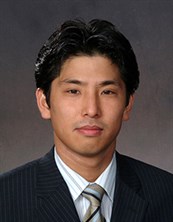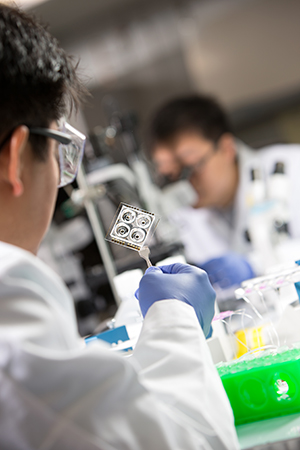 Dr. Arum Han, professor in the Department of Electrical and Computer Engineering at Texas A&M University, is the co-PI on a new $4.2 million Tissue Chip Testing Center established at Texas A&M.
Dr. Arum Han, professor in the Department of Electrical and Computer Engineering at Texas A&M University, is the co-PI on a new $4.2 million Tissue Chip Testing Center established at Texas A&M.
The center, which is one of two established by the National Center for Advancing Translational Sciences (NCATS) of the National Institutes of Health (NIH), will provide a way to test and validate the performances of developed tissue chips. The second center has been established at the Massachusetts Institute of Technology.
 A large number of potential medications fail during human clinical trials because they are found to be either toxic or do not have much effect. Tissue chips, also called organ-on-a-chip or microphysiological systems, are hybrid microsystems that contain both microfabricated structures and human cells to mimic the multi-cellular structure of human organs. These tissue chips are designed to mimic the function of organ systems, and are expected to be used in high-throughput drug screening and toxicity screening assays to faster and more accurately predict the effects of candidate drugs, vaccines or biological agents.
A large number of potential medications fail during human clinical trials because they are found to be either toxic or do not have much effect. Tissue chips, also called organ-on-a-chip or microphysiological systems, are hybrid microsystems that contain both microfabricated structures and human cells to mimic the multi-cellular structure of human organs. These tissue chips are designed to mimic the function of organ systems, and are expected to be used in high-throughput drug screening and toxicity screening assays to faster and more accurately predict the effects of candidate drugs, vaccines or biological agents.
The newly established testing center where Han is participating, TEX-VAL: Texas A&M Tissue Chip Validation Center, is led by Dr. Ivan Rusyn professor in the Department of Veterinary Integrative Biosciences at Texas A&M, and funded by a $4.2 million U24 cooperative agreement grant from NIH. Han has been developing microfluidic organ-on-a-chip systems, especially brain-on-a-chip systems, to facilitate drug development for treating neurological disorders. His expertise in microfluidics and organ-on-a-chip systems will be instrumental to the success of the center since the center will be charged to test up to 12 different tissue chips with various drug compounds.
The center will test how reproducible, accurate and reliable these developed tissue chips are, and also test whether the tissue chips reproduce the human physiological responses when tested with drug compounds. This stage is critical in moving tissue chips towards widespread use.
“This center grant is providing a unique opportunity for tissue chip developers, such as myself, to directly interact with toxicology researchers on campus as well as the pharmaceutical industry consortium and the regulatory agencies such as FDA, by providing a critical test bed for the emerging area of tissue chips,” Han said.
Han, director of the NanoBio Systems Lab and an expert in microfluidic lab-on-a-chip technologies, joined the electrical and computer engineering department in 2005. His research is at the interface of micro/nano technology and life sciences, with interest in solving grand challenge problems in the broad area of health and energy through the use of micro/nano systems technology and multidisciplinary team effort. He received the outstanding professor award from the department in 2012, a TEES Fellow award in 2012, the Eugene Webb Faculty Fellow from the college of engineering in 2014, an Engineering Genesis Award for Multidisciplinary Research in 2014, the E. D. Brockett Professorship Award in 2015 and the Dean of Engineering Excellence Award in 2016.
For more information visit:
NCATS/NIH website.
KBTX article and video.
Texas A&M Department of Veterinary Medicine and Biomedical Sciences News Reel.